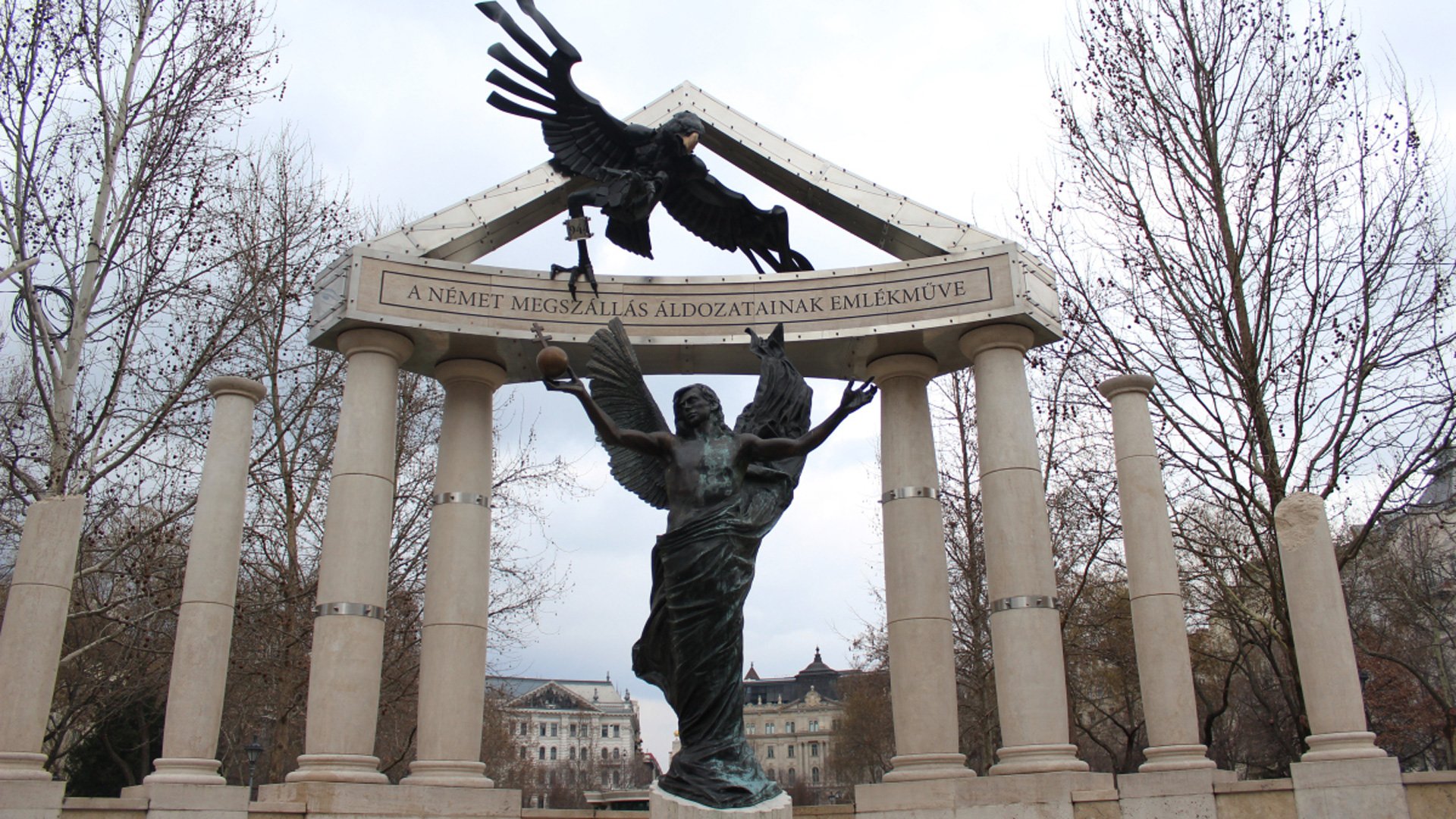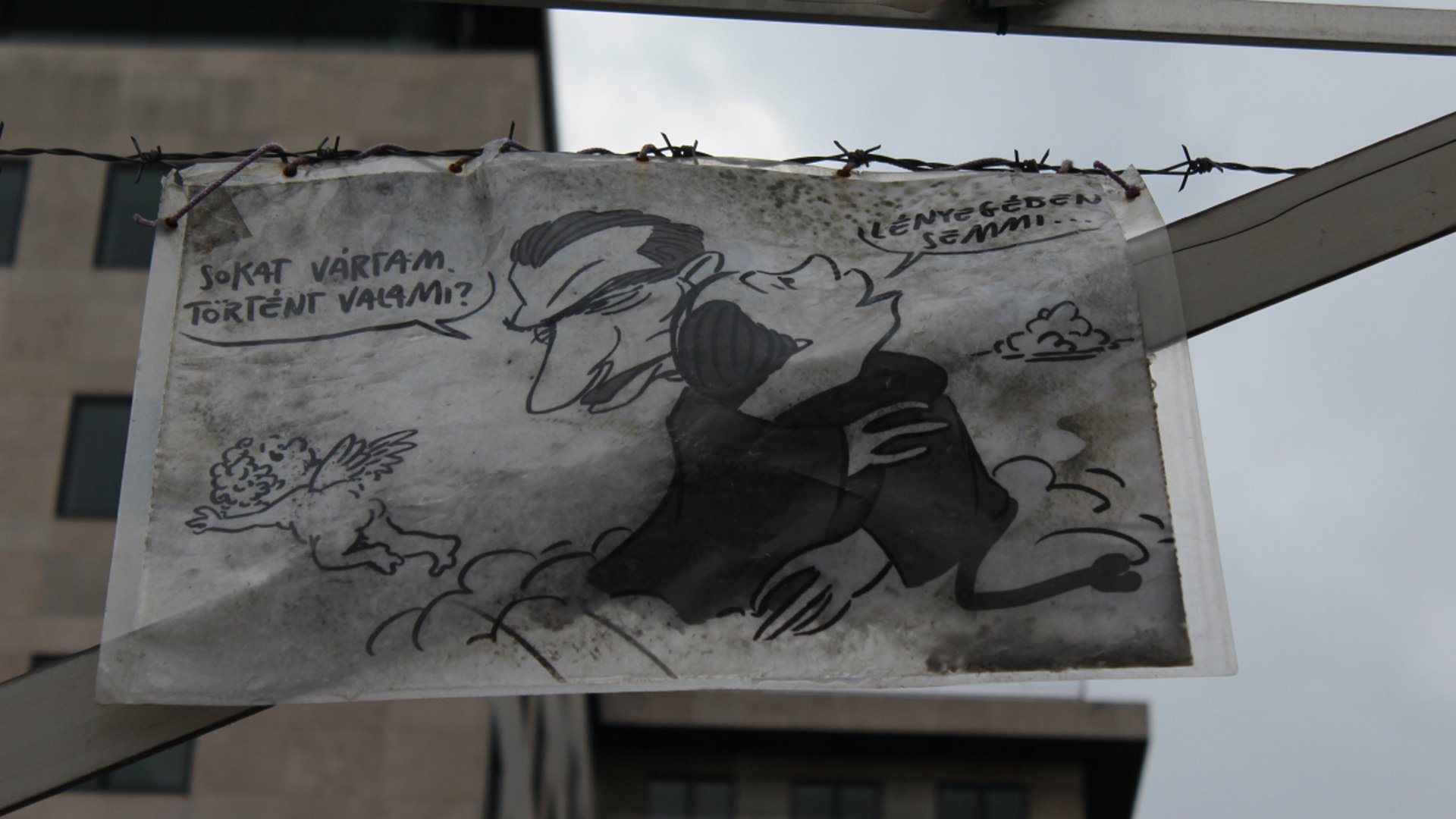

By Kelcie Grega / Cronkite Borderlands Project
Published July 11, 2016
BUDAPEST, Hungary — As a descendant of Holocaust survivors, George Weinberger-Vince says he sometimes thinks about World War II and the Jewish families who used to live in his flat.
He also ponders the ongoing complexities he and others face living in a country whose government sided with Nazis who killed hundreds of thousands of Hungarian Jews decades ago.
“Living in an old Jewish ghetto of Budapest in an apartment where probably dozens of Jewish families were forced to live together 70 years ago, sometimes makes me think of what had happened during the war,” he said.
But his Jewish roots were not a focus of his upbringing. “During my childhood, I never went to synagogue and neither did my friends,” he said. “Their identity was not religious which is common in Budapest.”
In 1941, Hungary was home to 825,000 Jews, the largest population of any country in central Europe.
Nearly 63,000 Hungarian Jews were killed or died prior to the Nazi occupation in 1944, according to the United States Holocaust Memorial Museum. After the Germans occupied the country, “just over 500,000 died from maltreatment or were murdered,” according to the museum website.
Today, there are fewer than 200,000 members of this community who grapple with commemorating their heritage, overcoming anti-Semitism and defining what it means to be a Hungarian Jew.
“It’s a special situation in Hungary,” said András Heisler, president of the nation’s leading Jewish advocacy group. “With the Hungarian government, we have a good relationship on one side, with financial support and help with restorations of synagogues and Jewish cemeteries. And on the other hand, there is a different face of the government: power trying to recreate and whitewash history.”
The discord boiled over when the government unveiled a statue in Budapest’s Freedom Square in 2014 to mark the 70th anniversary of the German invasion of Hungary. The statue, depicting an eagle attacking an angel, honors Hungarian victims without mentioning that most were Jewish. Critics said the government failed to acknowledge Hungarian government’s complicity in the Holocaust.

During the controversy, Viktor Orban, Hungary’s prime minister, released a statement saying the statue “is not a Holocaust memorial but a freedom-fighting people’s memorial of the pain of having its liberty crushed.”
But the explanation didn’t soothe tensions between the government and the Jewish community.
“During the 70th anniversary, we did not cooperate with the Hungarian government,” Heisler said, through a Hungarian translator.
Gradually, the community and the government have begun a dialogue, Heisler said, adding, “this cooperation shall not slide into collaboration.”
But the community worries anti-Semitism is never far from the surface. Four years ago, Jewish leaders were outraged far-right leaning Jobbik Party official Márton Gyöngyösi, urged the government to draw up a list of Jews who could represent a security risk to Hungary with potential loyalty to Israel. Orban’s government quickly condemned the proposal and amid the criticism, Gyongyosi dialed back his comments, suggesting he was only referring to Hungarians who hold dual citizenship, according to published reports.
Ursula Mindler-Steiner, a Jewish studies professor, said she witnessed anti-Semitism during protests in Budapest in 2011.
“What I experienced myself, was quite a lot of marching in the Jewish quarter,” said Mindler-Steiner, who is Austrian. “You could see the anti-Semitism; it got physical and people would spit at you in front of the synagogue, just because they thought you were Jewish – just for being a black-haired person in front of the synagogue.”
The experience and history of Jews in Hungary is not only of personal interest to Weinberger-Vince but is at the core of his business enterprises. He owns a family publishing company called Vince Books, which publishes books ranging in topics from art to gastronomy to Jewish history. He also owns a store called Weinberger Judaica.
He took back his grandfather’s name when establishing the store because he says he felt a connection to it. He also felt that a Jewish name would be more fitting for a Judaica store.
Growing up in Budapest, Weinberger-Vince always knew he was Jewish. He had been to Israel and he knew that his grandparents were Holocaust survivors, but his family was never very religious. He said he even remembers celebrating Christmas because it’s what Hungarians do.
“Being Jewish was very natural for us but there was no religious sense,” he said, noting that he is now more traditional and celebrates Jewish holidays. “My father was very interested in Jewish history. He read a lot and suggested a lot of books to me. But he didn’t care too much about religion.”

Today, where Weinberger-Vince lives is part of history. His flat is located in the notorious Jewish ghetto established by the Nazis in November 1944 where 70,000 people were held in cramped, often-deplorable conditions until the liberation of Budapest by the Soviet army almost four months later.
The deep sense of Jewish struggle and history in Hungary grounds him, he said.
“My Jewishness is fulfilled here,” he said. “Like when I go abroad and come back, I have this feeling that I’m home. Like with Israel, I thought it was a Jewish state but has nothing to do with my Judaism.”
At the Weinberger Judaica bookstore, clerk Gábor Somogyi said he was never unaware that he was a Jew but grew up very secular.
Even today, he said he only wears a kippah – a skullcap that shows reverence to orthodox tradition – “because we’re next to an orthodox synagogue.”
Secularism is not just a post-war phenomenon among Jews in Hungary. As far back as the late 19th century, Jews were very much integrated into Hungarian society, especially in Budapest, said Victor Karady, a professor of Jewish history at Central European University.
“Up to 80 percent of Hungarian Jews had Hungarian mother tongue which is exceptional in this part of the world because you don’t find that elsewhere even in countries that were much more economically developed,” Karady said.
Although he grew up in a secular family, Somogyi always identified with his Jewish background.
“Judaism is in my blood, but it isn’t my blood,” he said. “For me it was not a culture, it was just a knowing.”
But it wasn’t until Somogyi was 12-years-old that he decided he would have a circumcision ceremony after meeting his first love at summer camp.
“I loved her, but she didn’t know because I was very shy,” he said. “She was Orthodox. And I decided I wanted to make that… because I know this a major point in her life and this is the reason why I did it. That was 60 percent why I did it; the rest because I’m Jewish and should do it.”
But Somogyi said he feels his Hungarian identity just as strongly.
“I am Jewish living in Hungary, and my mother language is Hungarian, it’s very difficult to describe this feeling but I feel it very deeply,” he said. “This place that we call Hungary is what made me who I am.”
Composer, Asher Goldeschmidt, who wrote the score for the Hungarian film “White God” which received international acclaim at the 2014 Cannes Music Festival, also grew up in a secular family. Although he said he’s lived in Israel for 15 years, he feels that his primary identity is expression and art, not his heritage.
“I’m not sure what the Hungarian-Jewish, identity is,” he said. “I feel Jewish of course, and besides that, I identify myself with this Hungarian source because of the language – through language, I learned everything.”
Andras Borgula, who owns Gólem Színház, a Jewish cultural theater and hosts a radio show every week with 10,000 to 15,000 listeners, is trying to tell the Jewish story in Hungary in ways other than the Holocaust. In the past, Jewish theaters have used the Holocaust as a major theme in their productions and Jews on stage were primarily portrayed as victims.
“Whoever has to deal with the Holocaust topic is not the Jews,” he said. “It’s not a Jewish topic. It happened with us and we were suffering from it, but you have to digest it and you have to talk about it and I as a Jew talk about stories which are about love, hate, failure, success, sex, women and then you will learn that the Jews are exactly like the others.”

It is also not a criteria for the actors in Borgula’s theatre company to be Jewish. “Yes, it’s always about Jewish topics … but not every actor who plays Hamlet has to be Danish and his father have to be killed by his uncle,” he said.
Borgula didn’t grow up knowing he was Jewish. Until he was 14, he was just Hungarian. Borgula was spending the weekend with his grandparents the day he found out he was Jewish in 1989, shortly after the Iron Curtain had fallen in Hungary.
“The phone was ringing and I ran to the phone and somebody asked if Haim is living there,” he said.
But Borgula knew his grandfather’s name was Heinrich. Then, the caller asked if his grandmother’s name was Malkah. But he knew her name was Elizabeth.
“I saw my grandmother walk into the hallway and saw me speaking with someone on the phone and she almost fainted,” he said. “Then she goes, ‘who is this on the phone?’ And I said, ‘I don’t know, it’s a crazy guy looking for Haim and Malkah.”
It turned out, that the caller was a relative living Israel who had left Hungary in 1946 and was trying to reconnect with his Hungarian family.
“When I asked about it my grandmother said, ‘We are Jews, dinner is ready, let’s go to eat,’” he said.
Borgula’s circumstances are not uncommon in Hungary. After the Holocaust, survivors would choose not to tell their children of their Jewish heritage.
Rabbi Slomó Köves said his grandparents were Holocaust survivors who decided they didn’t want to have any more connection to their Jewish heritage after the war.
“My parents found out accidentally that they were Jewish and that’s a very typical story in Hungary and in the states, too,” he said.
This is why the Chabad movement — which helps Jews connect with their heritage — is so important to Köves, especially in a place like Hungary.
The presence of the Jewish identity was not depleted by the Holocaust alone. During the communist era in Hungary, Jews were safe from anti-Semitism so long as they didn’t practice their religion, Köves said.
“Jews had no possibility of having a Jewish identity, but still there was no anti-Semitisim at the same time,” he said. “During the 40 years of communism, a lot of Jewish people did not feel comfortable talking about their Jewish origins.”
But today, Köves believes that Hungary is experiencing a small Jewish renaissance.
“It’s hard to say if we will be able to build it back up,” he said. “It’s a whole different situation, and it’s never going to go back to the way it was before the war.”
Köves said he believes the two identities can exist simultaneously.
“I personally believe that there is an alternative of Hungarian identity that should have no problem getting along with Jewish identity,” he said. “You can have both of them, the same way you can be Jewish-American and how it doesn’t conflict in any way.”
Buffett student projects include: Nicaragua: Channeling the Future | Chiapas: State of Revolution | Two Borders | Puerto Rico: Unsettled Territory | Stateless in the Dominican Republic | South Africa: At the Crossroads of Hate and Hope | South Africa Documentary | Borderlands Photo Essays | Divided Families (PDF) | Divided Families Documentary | Children of the Borderlands | South Africa Project
Cronkite News is the news division of Arizona PBS. The daily news products are produced by the Walter Cronkite School of Journalism and Mass Communication at Arizona State University.